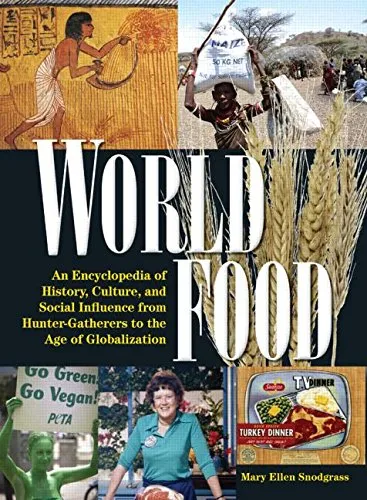World Food: An Encyclopedia of History, Culture, and Social Influence from Hunter-Gatherers to the Age of Globalization
4.0
Reviews from our users

You Can Ask your questions from this book's AI after Login
Each download or ask from book AI costs 2 points. To earn more free points, please visit the Points Guide Page and complete some valuable actions.Introduction to "World Food: An Encyclopedia of History, Culture, and Social Influence from Hunter-Gatherers to the Age of Globalization"
"World Food" is a groundbreaking and encyclopedic exploration of humanity's journey through the vast landscape of food — from the humble roots of hunter-gatherer societies to the multifaceted modern age of globalization. Authored by Mary Ellen Snodgrass, this comprehensive reference work delves into the interconnected history, cultural significance, and social influences of food around the globe. It serves as a thought-provoking guide to understanding not only what we eat but also why, where, and how we eat. Food, in this context, is not just a biological necessity; it is a cultural marker, a historical narrative, and a powerful agent of change.
Detailed Summary of the Book
At its core, "World Food" examines humanity’s intricate relationship with food, tracing its evolution through the millennia. The book spans global culinary traditions, from the wild roots and foraged berries of early hunter-gatherers to the farm-to-table movements and global food supply chains of contemporary times. It addresses key turning points in food history, such as the advent of agriculture, the Columbian Exchange, industrialization, and the modern phenomena of fast food and fusion cuisines. This sweeping narrative captures the role food has played as a unifier and divider among peoples, as well as its inextricable connection to social rituals, trade, religion, politics, art, and science.
Through a combination of historical anecdotes, cultural insights, and scholarly analysis, the book examines a wide range of topics, including the origins of specific ingredients, traditional recipes across regions, and the globalization of various cuisines. It also explores food-related issues such as famine, access to resources, dietary practices, and the impact of modern technology on food production. By doing so, readers are offered a deep understanding of how food influences and reflects societal values and priorities.
The encyclopedia is rich with entries encompassing indigenous foodways, regional specialties, culinary innovations, and historical interactions between different regions and cultures. It demonstrates how food is more than sustenance — it is a force that shapes economies, inspires art and literature, and bridges (or sometimes disrupts) relationships in a continually globalizing world.
Key Takeaways
- The transformative power of food throughout human history, from its survival-based origins to its current role in global trade and diplomacy.
- An appreciation for cultural diversity, as reflected in the cuisines and foodways of various regions across the globe.
- The impact of major historical events, such as colonization and industrialization, on the foods we eat today.
- The significance of food in shaping human identities, societal structures, traditions, and beliefs.
- Challenges and ethical questions surrounding modern food production, including sustainability, resource scarcity, and food security.
Famous Quotes from the Book
"Food is the silent storyteller of humanity’s history — a reflection of its struggles, triumphs, connections, and transformations."
"What we eat is not merely a personal choice, but an act that reveals political, cultural, and global dynamics."
"From the ritual of breaking bread to the conviviality of a shared meal, food is the universal language of connection."
"The story of food is the story of civilization itself."
Why This Book Matters
In a world increasingly aware of the complexities surrounding food — from concerns over sustainability to a revived interest in traditional practices — "World Food" stands as a vital resource for scholars, enthusiasts, and anyone curious about the cultural and historical significance of what ends up on their plate. Beyond an encyclopedia, the book is a celebration of humanity's creativity and resilience in its eternal quest to nourish itself. It fosters a deeper appreciation of food as a uniting force, capable of bridging gaps between diverse peoples and traditions.
Mary Ellen Snodgrass masterfully brings together an unparalleled synthesis of historical research and cultural observation, making the book an indispensable tool for academics, culinary historians, sociologists, and global citizens alike. By understanding the past and present of food, readers are also empowered to make more mindful choices about the future — be it in their personal consumption or in advocating for sustainable food policies. The book proves that the journey of food is, in essence, the journey of humanity itself.
Free Direct Download
You Can Download this book after Login
Accessing books through legal platforms and public libraries not only supports the rights of authors and publishers but also contributes to the sustainability of reading culture. Before downloading, please take a moment to consider these options.
Find this book on other platforms:
WorldCat helps you find books in libraries worldwide.
See ratings, reviews, and discussions on Goodreads.
Find and buy rare or used books on AbeBooks.
1177
بازدید4.0
امتیاز50
نظر98%
رضایتReviews:
4.0
Based on 0 users review
"کیفیت چاپ عالی بود، خیلی راضیام"
Questions & Answers
Ask questions about this book or help others by answering
No questions yet. Be the first to ask!


